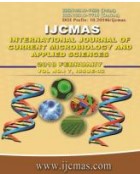


 National Academy of Agricultural Sciences (NAAS)
National Academy of Agricultural Sciences (NAAS)

|
PRINT ISSN : 2319-7692
Online ISSN : 2319-7706 Issues : 12 per year Publisher : Excellent Publishers Email : editorijcmas@gmail.com / submit@ijcmas.com Editor-in-chief: Dr.M.Prakash Index Copernicus ICV 2018: 95.39 NAAS RATING 2020: 5.38 |
Weeds are the most underestimated crop pests in agriculture and cause 37-40% reduction in the yields of various crops. They decrease quantity and quality of farm produce/food, forage/fodder and animal products (meat and milk), and cause health hazards for humans and animals. Thus, weed control is indispensable in every crop production system. The present study was undertaken to evaluate the herbicidal activity of rhizosphere bacteria against the Chenopodium album (bathu) weed. Ninety five bacteria were obtained from the rhizosphere of wheat and mustard, and screened for ALA (δ-aminolevulinic acid) production. Overall, 80% of the rhizobacterial isolates produced ALA. Out of these, 10 bacterial isolates were selected for retardation or stimulation effect on seed germination of Chenopodium album weed on 0.8% agar incorporated plates. Four rhizobacterial isolates showed root growth inhibition and three bacterial isolates caused shoot growth inhibition at both 5th and 10th day of seed germination. Four rhizobacterial isolates showed moderate growth on ACC supplemented plates. Similarly, production of IAA varied in different rhizobacterial isolates and five isolates produced more than 4.0 μg ml-1 IAA. Based on beneficial attributes, three bacterial isolates WHA82, MSA39 and WHA100 were examined for their effect on growth of wheat and weed under pot house conditions. Inoculation of bacterial isolate MSA39 caused 43-53% decrease in root dry weight (RDW) and 31-47% decrease in shoot dry weight (SDW) of Chenopodium album at 60 and 90 days of plant growth, whereas its inoculation showed 122-144% increase in RDW and 205-124% increase in SDW of wheat. Inoculation with bacterial isolates WHA82 and WHA100 also decreased root and shoot dry weight of C. album at both the stages of observations. These rhizospheric bacterial isolates MSA39 and WHA100 could be further tested for suppression of weed growth under field conditions for their subsequent application as biofertilizer and bioherbicide.
 |
 |
 |
 |
 |